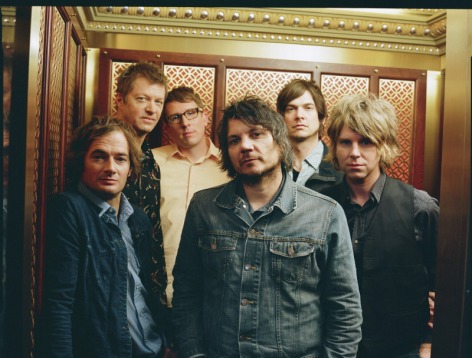"Wilco's Unconventional Tour"
Published in Berkshire Eagle, 8/8/08

By Jeremy D. Goodwin
LENOX—Wilco played.
It was outside. It was raining. It was cold. It was Alaska.
That's how the summer tour started two weeks ago for possibly the best band in America.
Wilco performed in front of a few thousand fans at two outdoor shows in America's northernmost state, including one in the parking lot of an Anchorage pub called Moose's Tooth. It was dampened by a prolonged downpour.
Why Alaska?
"It's part of Wilco's 50-state strategy," frontman and primary songwriting force Jeff Tweedy quipped, with dry merriment, in a phone interview while driving around his native Chicago the week before the tour opened.
These unconventional tour dates were just the opening salvo of an unconventional tour that lands at Tanglewood on Tuesday. Other venues include an opera house and a noted rock formation in Utah. Plus, by the way, a headlining slot at Lollapalooza.
It all makes sense for a decidedly independent band that, over 14 years and multiple lineup changes—Tweedy and bassist John Stirratt are the only remaining original members—have created a body of work that consistently defies expectation. Their six studio albums wander from alternative country rock to multi-layered, brass-backed adult pop to experimental electronic freak-outs, back again (with 2007's "Sky Blue Sky") to a sort of laid back, country rock vibe.
"I don't think we're capable of making the same record twice even if we wanted to," Tweedy says. "I've never been of that mindset that we make something and refine it and refine it until you get it perfect…It's like trying to have the same birthday over and over again."
The current, six-piece formation of the band has been intact since 2004, and Tweedy says they've hit upon the "definitive" combo that finally actualizes "our view of what Wilco is."
"I don't remember ever having, on any level that you want to look at it—friendship-wise, closeness of the whole band, chemistry-wise, musicianship—I think that there's a really solid argument to be made that things are working better than they ever have in the past," he says.
And they had been working pretty well anyway.
Already noted for their dynamic, mood-swinging performances featuring different set lists nightly, Wilco today possess their deepest-ever live repertoire, having learned their entire back catalog for a five-show February run in Chicago.
Since then the band have recorded about 11 new songs for their next album, Tweedy says, followed by some time off, but he expects to be able to dig deeply into the oeuvre on tour.
"I think we'll still remember everything we did in February. By the time we get to Tanglewood we'll be pretty limber and agile again," he says. "It was a really great exercise to, as we put it, 'own' the entire catalog. It's kind of overdue."
LENOX—Wilco played.
It was outside. It was raining. It was cold. It was Alaska.
That's how the summer tour started two weeks ago for possibly the best band in America.
Wilco performed in front of a few thousand fans at two outdoor shows in America's northernmost state, including one in the parking lot of an Anchorage pub called Moose's Tooth. It was dampened by a prolonged downpour.
Why Alaska?
"It's part of Wilco's 50-state strategy," frontman and primary songwriting force Jeff Tweedy quipped, with dry merriment, in a phone interview while driving around his native Chicago the week before the tour opened.
These unconventional tour dates were just the opening salvo of an unconventional tour that lands at Tanglewood on Tuesday. Other venues include an opera house and a noted rock formation in Utah. Plus, by the way, a headlining slot at Lollapalooza.
It all makes sense for a decidedly independent band that, over 14 years and multiple lineup changes—Tweedy and bassist John Stirratt are the only remaining original members—have created a body of work that consistently defies expectation. Their six studio albums wander from alternative country rock to multi-layered, brass-backed adult pop to experimental electronic freak-outs, back again (with 2007's "Sky Blue Sky") to a sort of laid back, country rock vibe.
"I don't think we're capable of making the same record twice even if we wanted to," Tweedy says. "I've never been of that mindset that we make something and refine it and refine it until you get it perfect…It's like trying to have the same birthday over and over again."
The current, six-piece formation of the band has been intact since 2004, and Tweedy says they've hit upon the "definitive" combo that finally actualizes "our view of what Wilco is."
"I don't remember ever having, on any level that you want to look at it—friendship-wise, closeness of the whole band, chemistry-wise, musicianship—I think that there's a really solid argument to be made that things are working better than they ever have in the past," he says.
And they had been working pretty well anyway.
Already noted for their dynamic, mood-swinging performances featuring different set lists nightly, Wilco today possess their deepest-ever live repertoire, having learned their entire back catalog for a five-show February run in Chicago.
Since then the band have recorded about 11 new songs for their next album, Tweedy says, followed by some time off, but he expects to be able to dig deeply into the oeuvre on tour.
"I think we'll still remember everything we did in February. By the time we get to Tanglewood we'll be pretty limber and agile again," he says. "It was a really great exercise to, as we put it, 'own' the entire catalog. It's kind of overdue."

Photo: Autumn De WIlde
The band's progress, both commercially and artistically, has not been linear. Their best-selling record to date is 2001 masterpiece Yankee Hotel Foxtrot, which became a cause celebre in some circles when their record label Nonesuch refused to release it, ostensibly due to lack of commercial potential.
The recording process caused a near meltdown (documented with painful clarity by the documentary film I Am Trying To Break Your Heart) that climaxed with multi-instrumentalist Jay Bennett's expulsion from the band. The 2004 release of their follow-up album, a ghost is born, was delayed when Tweedy entered rehab for an addiction to painkillers brought on by his experience with chronic migraines. Their most recent album was celebrated by critics quick to praise the band's eclecticism, but confounded many hipster fans who had grown used to more explicitly experimental work and were thrown off by the set of breezy, deceptively accessible songs.
Even the band's official biography cites Tweedy's "near-collapse from
drugs and mental illness and the hard fought rehabilitation which followed."
So as this road-tested unit—with a bagful of new songs already laid down and a return trip to the studio scheduled for October—is described by Tweedy as reaching a collaborative peak, the observation comes from a perspective of deep experience.
"Everybody has a really grounded ability to wake up in the morning and go, 'I can't believe I get to do this,'" Tweedy says. "I think everybody in this band has been around long enough and been in other bands and situations enough times to be able to wake up and be honest about that. That's pretty much the bottom line."
This is notable "especially after you've been around for a long time and gone the other way and degenerated," he adds.
Any band that chooses to preface a headlining gig in front of 75,000 fans at Lollapalooza by playing for a parking lot full of soaking wet Alaskans is a confident one.
This much we know.
But as for whatever—and wherever—Tweedy and company will play next, all prediction is futile.
The recording process caused a near meltdown (documented with painful clarity by the documentary film I Am Trying To Break Your Heart) that climaxed with multi-instrumentalist Jay Bennett's expulsion from the band. The 2004 release of their follow-up album, a ghost is born, was delayed when Tweedy entered rehab for an addiction to painkillers brought on by his experience with chronic migraines. Their most recent album was celebrated by critics quick to praise the band's eclecticism, but confounded many hipster fans who had grown used to more explicitly experimental work and were thrown off by the set of breezy, deceptively accessible songs.
Even the band's official biography cites Tweedy's "near-collapse from
drugs and mental illness and the hard fought rehabilitation which followed."
So as this road-tested unit—with a bagful of new songs already laid down and a return trip to the studio scheduled for October—is described by Tweedy as reaching a collaborative peak, the observation comes from a perspective of deep experience.
"Everybody has a really grounded ability to wake up in the morning and go, 'I can't believe I get to do this,'" Tweedy says. "I think everybody in this band has been around long enough and been in other bands and situations enough times to be able to wake up and be honest about that. That's pretty much the bottom line."
This is notable "especially after you've been around for a long time and gone the other way and degenerated," he adds.
Any band that chooses to preface a headlining gig in front of 75,000 fans at Lollapalooza by playing for a parking lot full of soaking wet Alaskans is a confident one.
This much we know.
But as for whatever—and wherever—Tweedy and company will play next, all prediction is futile.
